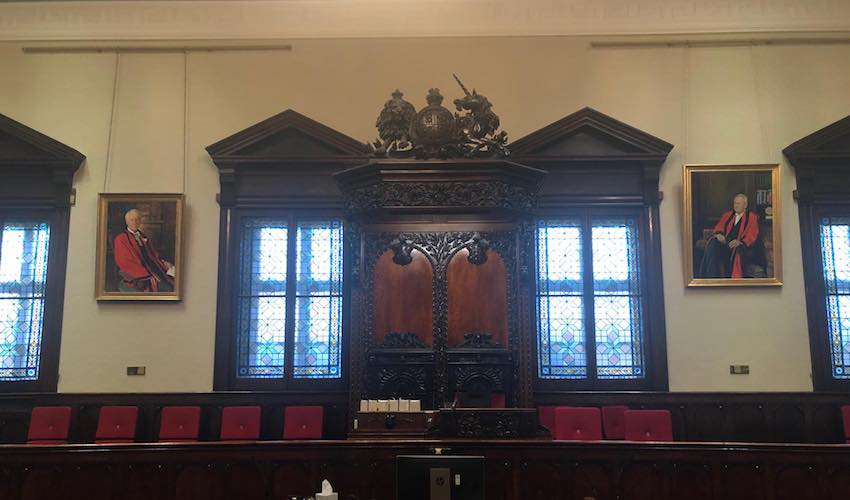


A man accused of attempting to murder a pubgoer with a kitchen knife handed himself to police before travelling to the station and telling an officer and doctor about feeling the blade go "all the way through", a jury heard yesterday.
Paul Anthony Hadikin (57) denies one count of attempted murder and one alternative count of grave and criminal assault relating to the alleged stabbing of a 33-year-old man at the Temple Bar in Stopford Road on the evening of 3 December 2021.
Opening the case for the prosecution before a jury in the Royal Court on Monday, Crown Advocate Matthew Maletriot said that the stabbing was a “deliberate and targeted act of revenge” after a physical altercation with the victim in the Temple Bar earlier that evening.
Mr Hadikin left the premises immediately after this initial altercation, but then allegedly re-entered the pub 13 minutes later, stabbed the man once in the abdomen, and left again within seconds.
Described as "life-threatening", the stab wound was more than six inches deep.
On the second day of the trial, the jury heard witness accounts from barmen who were working at the Temple Bar on the night of the stabbing, as well as from the police officers who attended the scene as first responders.

Pictured: The Royal Court trial is expected to last for the rest of this week.
PC Brown and PC Elliot were the first members of the emergency services to arrive on the scene of the stabbing. They were informed by other patrons of the Temple Bar that the attacker had fled the scene whilst the victim remained inside.
The jury were shown the bodycam footage of the police officers arriving at the scene and administering emergency first aid until the paramedics arrived a few minutes later.
In his statement, PC Elliot described the victim as being “grey in colour” and said that he “immediately knew that the injury was serious”.
The jury then heard a statement from PC Rouse who was part of the team of police officers who went to Mr Hadikin’s flat later that night in an attempt to find and arrest the suspect.
Whilst firearms officers entered the building where Mr Hadikin’s flat was located, PC Rouse remained in the driver’s seat of the van which was intended to be used to transport the suspect to the Police Station after his arrest.
As he was waiting in the van on Janvrin Road, PC Rouse looked at a photograph of Mr Hadikin from the police database on his handheld device in order to familiarise himself with the suspect’s appearance.
A short while later, PC Rouse noticed a man approaching the van on foot from about 10 feet away. The unarmed police officer recognised this man to be Mr Hadikin from the photograph he had recently viewed.
PC Rouse then described how he contacted the firearms officers via radio who began to make their way back towards Janvrin Road.
Mr Hadikin approached the window on the driver’s side of the car, which was slightly open, and said to PC Rouse: “Can you take me to the police station, please?”
The jury then heard how firearms officers arrived back at Janvrin Road soon after and arrested Mr Hadkin on suspicion of attempted murder.
The next witness called to the stand was Police Sergeant Dupre, who searched and arrested Mr Hadikin after he was radioed by PC Rouse and returned to Janvrin Road.
Sergeant Dupre said that Mr Hadikin came across as “calm and lucid” during the arrest. He told the jury that that the defendant spoke to him, saying: “I thought I’d save you the trouble of looking for me, I obviously know what this is about”.
The jury were shown footage of the arrest from Sergeant Dupre's bodycam.

Pictured: The stabbing took place in the Temple Bar on Stopford Road, St. Helier.
PC Scotland, who was working as the custody jailer on the night of 3 December 2021, also gave evidence. He explained to the jury that the role of the custody jailer is to book people who have been arrested into jail and look after their welfare while they are in custody.
Taking to the stand, PC Scotland described Mr Hadikin as initially “quiet”. However, when he escorted him into his cell, PC Scotland told the jury that Mr Hadikin said to him: “I’m f***ed”.
Mr Hadikin allegedly repeated this phrase again, making a gesture of a stabbing motion to the lower abdomen stomach area. He then added: “It went in, it went all the way through.”
The jury then also heard evidence from Dr Deryn Evans, a forensic medical examiner contracted by the States of Jersey Police, who had examined Mr Hadikin immediately after he was arrested and the next day.
She said that Mr Hadikin made admissions of drinking three pints over the course of the evening. She added that he “didn’t strike me as overly intoxicated but he’d obviously consumed some alcohol” as his “breath smelt of alcohol”.
Describing Mr Hadikin’s mental state, she said that the defendant was “calm and polite” and there was “no evidence of any auditory or visual hallucinations”.
Mr Hadikin informed Dr Evans that he had lots of trauma in his life alongside a history of anxiety and depression, but described himself as “strong in mind”.
Physically, Dr Evans described a “laceration on the left underside of his top lip” which is usually sustained from blunt force trauma to the mouth which causes the inside of the lip to be ripped on the teeth.
The jury were shown photographs of Mr Hadikin's lip injury that were taken by Dr Evans at the time of the examination.
She said that this injury was consistent with being headbutted, as Mr Hadikin had described to her. She added that “there was blood on the lips which suggested that the injury was recent” as well as a “slight chip on the upper left tooth”, but “no further injuries”.
Referring to her notes written during the examination, Dr Evans said that Mr Hadikin had said to her: “He headbutted me for no reason, I went home and got a large kitchen knife. He shouldn’t have done it. I am an old man with a fractured coccyx, I can’t defend myself. I’ve got no conscience. Is he dead?”
There was also a retrospective entry to Dr Evans notes which she added later when she recalled the defendant also saying: “I think the knife went through to the other side, I felt it.”
In cross-examination, defence lawyer Advocate Steenson asked Dr Evans if she though Mr Hadikin could have perhaps meant to say “I have no consciousness” rather than “I have no conscience.”
However, Dr Evans replied that Mr Hadikin had given “an articulate account of what had happened” that night, so she therefore had “no reason to think there was memory loss”.
When Dr Evans examined Mr Hadikin for the second time the next day, she said that he “reported that had fallen backwards after he was hit in the face and had hit the back of his head, which he hadn’t disclosed during the first examination”.
She therefore checked Mr Hadikin for concussion and examined the back of his head in further detail but found no additional injuries.
Mr Hadikin also said to the doctor: “It was all a daze, I was hit in the face unexpectedly. I went backwards and banged my head on the floor, that’s went it all went weird. Something came over, I don’t know what it was.”
He also added that he had forgotten to mention that he had consumed a bottle of wine during the day of the stabbing, prior to the three pints he consumed in the evening.
The trial, which is being conducted under the direction of Royal Court Commissioner Julian Clyde-Smith, is expected to last until the end of the week.
It continues this morning.
Comments
Comments on this story express the views of the commentator only, not Bailiwick Publishing. We are unable to guarantee the accuracy of any of those comments.